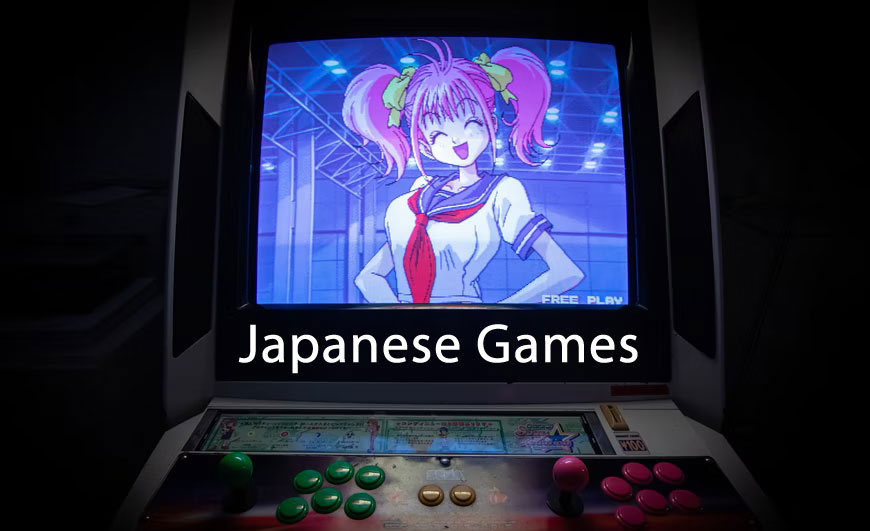Are you ready to try something new? Why not indulge yourself in some fun Japanese games?
Let’s say you are invited to your Japanese friend’s house party in Japan. Chances (though slim) are they will be playing some Japanese party games, especially traditional Japanese games. Rather than wasting everyone’s time spent on explaining the rules of the game, why not familiarize yourself with some of the most fun and popular Japanese games?
In this article, let’s learn about some of the traditional Japanese games that we will be able to enjoy with our friends and family.
Here Are Some Traditional Japanese Games That You Must Play
1. Hanetsuki
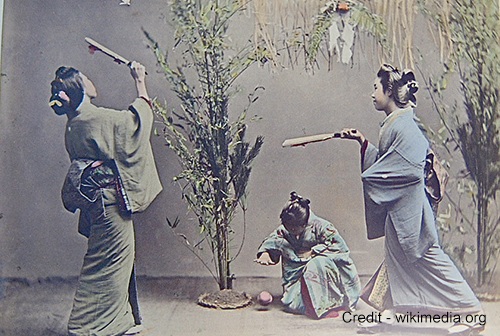
Much like badminton, Hanetsuki, also known as Oibane, is played (mostly by females) using hagoita (rectangle-shaped wooden paddle) and hane (colorful shuttlecock). However, unlike badminton, a net is not a necessity. The purpose of the game is to hit the hane upwards with the hagoita and keep it aloft as long as possible. The hane can also be passed back and forth by two people like other racket games.
Japanese girls usually play Hanetsuki at New Year as it is believed that whoever wins will be protected from mosquitoes the entire year. Among the old Japanese games, it is not as popular as it used to be.
If you are a fan of racket games, you will definitely enjoy this one. Make it enjoyable by setting your own rules, like whoever drops the ball first gets a penalty.
2. Uta-garuta
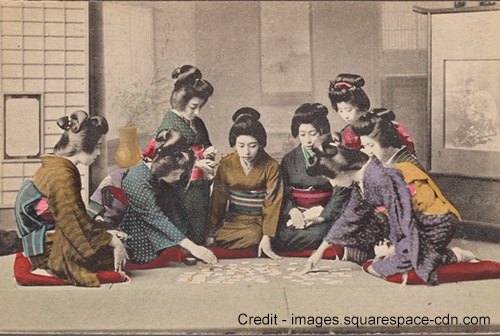
Uta-garuta is a Japanese card game with waka (Japanese classical poetry) written on every card. A deck consists of 100 cards and is usually played during the Japanese New Year holidays.
The first thing you need to know to play this fun Japanese game is that there are two types of cards –
- Yomifuda consists of 100 cards, and each card contains a figure of a person, his name and a poem.
- Torifuda also comes with 100 cards but with only the end of poems on each.
People who play this game would sit on the floor, and all the cards would be placed between the players. Then, one person would read the poem written on the Yomifuda card, and the players would then frantically search for the Torifuda card that contains the last phrase of the poem.
Ogoola Karuta is an English version of Uta-garuta that we are sure you and your friends could play as a fun drinking game.
3. Janken
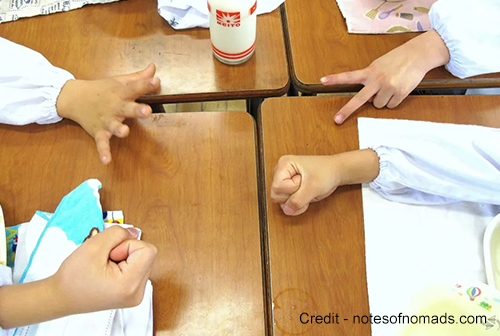
Have you ever played rock paper scissors with your friends? We all know how it goes, right? Just in case you don’t, this is how it works: Rock beats scissors; paper beats rock and scissors beats paper.
Well, in Japanese, this worldwide famous game is called Janken. Many decisions and disputes between friends and families are settled in Japan through Janken. Take a look at the Japanese version of rock paper scissors:
- Guu (ぐう) – Rock
- Paa (ぱあ) – Paper
- Choki (ちょき) – Scissors
Usually, we could say “Rock Paper Scissors” in English when playing this game. However, in Japanese, you would have to say “Saisho wa guu” (最初はぐう?) while pumping your fist, followed by “Janken pon!” (じゃん拳ぽん!?). As soon as the word “Pon” is said, you have to show guu, paa or choki.
Just to make it more intense and exciting, try Janken the next time you play rock paper scissors.
4. Keidoro
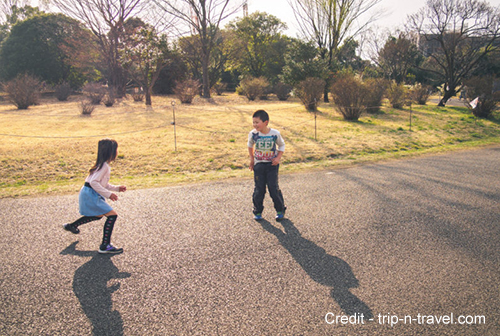
Keidoro is a tag game involving cops and robbers, kei and doro in Japanese, respectively. While there are many different ways to play this game, the most common is when people are divided equally into two groups. One group consists of kei and the other, doro. When the doro catches a kei, he takes him to a keimusho (prison), a place they have assigned in advance. The kei will be freed once another robber comes to rescue him. Once all the keis are caught by the doros, the end is won by the doro team.
This is an ideal game for kids, especially during birthday parties.
5. Hanafuda
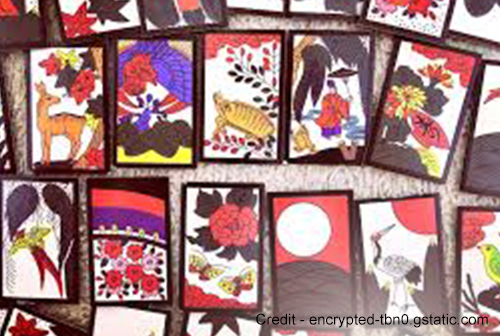
Also known as “flower cards”, this famous Japanese card game’s uniqueness is that the cards are smaller (5.4 by 3.2 cm) compared to other playing cards but thicker. With 48 cards in one set, one card depicts a human while the others have pictures of animals, plants and other objects. Usually, the backsides of the cards are black or other plain colors.
You can play different games with this card, such as Koi-koi, Tensho and Hachi.
Here is how the game works. Eight cards are laid out face-down between each player. The dealer goes first and tries to match a card he has in his hand and picks the one from the table to make a pair. If he cannot make a pair, he must discard a card on the table. In case of a tie, the dealer wins.
For those who enjoy card games, this is a must-try.
6. Kendama
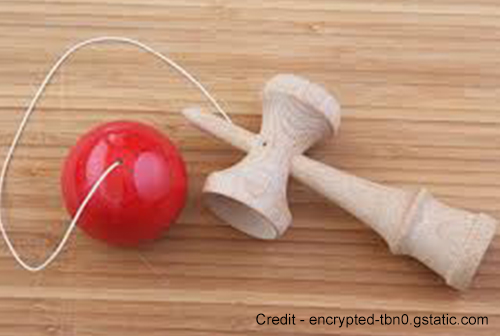
Believed to have dated back to the 17th or 18th century. Kendama, which is translated to “sword and ball (けん玉)” in Japanese, is a popular traditional game in Japan. It has its own competition called the Kendama World Cup, which is held every year in Japan.
The game consists of 3 important pieces of equipment:
- Ken (a handle)
- Sarado (a pair of cups)
- Tama (a ball).
The object of the game is to balance the Tama on the Ken or the Ken on the Tama. One significant and helpful method that experts of this game would use is bending their knees. There are also many tricks and combinations they experts would use to win such as pulling up the Ttama with the entire body and pulling the ball up into the small cup, among many others.
For the competitive souls, try this game out with your friends.
7. Oni Gokko
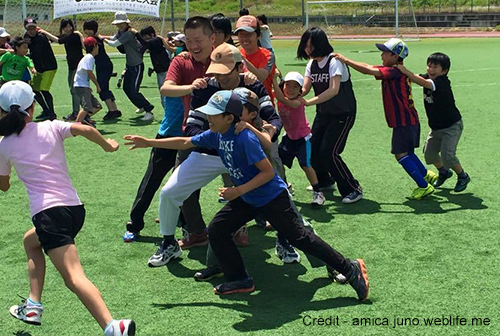
This game of tag has a little dark twist: Players have to run away from Oni (demons) and once the Oni catches them, they become the Oni. This fun Japanese game can be played by people of all ages and the more the merrier.
The rules are simple:
- Using Janken (Rock Paper Scissors), pick the Oni.
- The Oni then turns around, closes his eyes and counts to 10, during which the players hide or move far away from him.
- After the count of 10, the Oni begins the chase and whoever he catches/tags becomes the new Oni.
This is an ideal school playground game where even teachers and parents can participate.
8. Daruma Otoshi
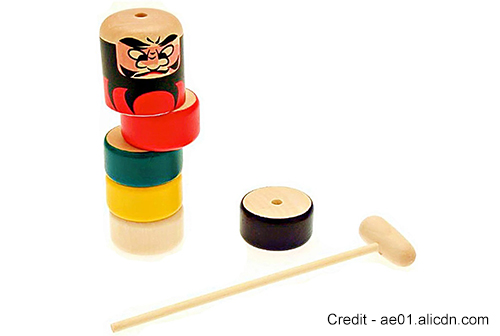
Daruma Otoshi is a classic Japanese game with a cylindrical Daruma head resting on top of five cylindrical wooden pieces. The object of the game is to hit the bottom wooden pieces with a small hammer to bring the Daruma to the bottom.
If you like playing Jenga, then this game is for you.
Let’s call it here for now because our brains can handle only so many new games and rules at a time. We hope you have fun playing the above-mentioned common Japanese games.
We will leave you here with our best wishes.
Until next time, sayonara for now!

